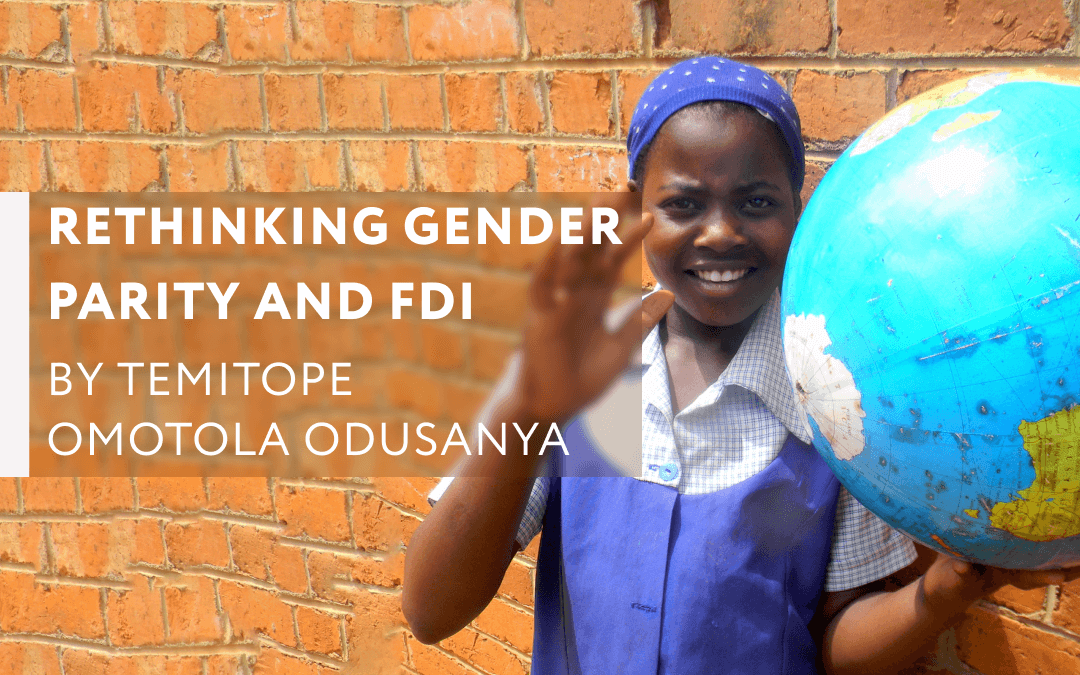Rethinking Gender Parity and FDI
by
Temitope Omotola Odusanya*
Gender disparity is arguably one of the greatest impediments to global development. The FDI’s landscape is often an overlooked avenue in gender equality discourse. Yet, it propels tapping equally into the reservoir of capabilities. Although it is sometimes a struggle to link the benefits of gender equality to FDI, it is nonetheless increasingly recognized as important for economic enhancement. This Perspective focuses on the dynamics between gender parity and FDI.
As a matter of best practice in FDI, it can enhance significant economic impacts and technological advancements, and it can also breed competitive advantage. Moreover, MNE investors from more gender-diversified countries could feasibly influence best-practice procedures regarding domestic standards and they can advocate for gender balance in their host countries. As a principled international standard benchmark denotes, gender balance will be efficient and beneficial on the macro level and maximise productive capacity.
Rethinking gender parity is appropriate for fostering gender responsive FDI and eventually impacting women. This is aligned with how countries are developing priorities and how the United Nations Sustainable Development Goals (SDGs) are related to revitalizing trade and promoting companies to attract, retain and expand FDI.
FDI and gender equality are intertwined as a double-edged sword, meaning that FDI could be both a contributor and a shackle to gender parity.
Prima facie, foreign affiliates can play a positive role in altering gender disparities in the long run, particularly by employing more skilled women. For example, foreign direct investment in largely export-oriented and labour-intensive industries has had substantial impacts on women’s work and development. FDI can also be an avalanche for skills, training, and access to markets. For example, foreign companies often bring advanced technology, management practices, and training opportunities. This can lead to skill development and capacity-building for both men and women in the host country, potentially reducing gender-based skill gaps. FDI can relieve local businesses, including women-owned enterprises with access to global markets. This can inadvertently empower women entrepreneurs to expand their businesses and generate income.
However, foreign affiliates also underpay female employees in comparison to domestically-owned firms. In addition, as industries upgrade, women seldom get promoted often losing their jobs to similarly qualified men. Negative assumptions and exploitation also exist, based on a country’s gender-policy provisions, as some countries are more gender equality conscious than others. FDI could lead to land displacement and exodus, affecting communities and possibly exacerbating gender disparities. Dependency and cultural challenges further reflect more downsides of gender parity and FDIs. For instance, overreliance on FDI for economic growth can sprout vulnerability to external economic distresses, which might have a disproportionate impact on women. Furthermore, foreign investors might cause altered cultural norms and practices that could clash with local gender norms and hinder progress toward gender equality.
Ultimately, FDI, whether inflow or outflow, is essential to both developed and developing economies. Gender parity and FDI are crucial for fostering inclusion, sustainable growth, and economic diversification. Foreign investors may impact corporate social responsibility (CSR) projects that focus on gender equality, education, healthcare, and other areas that can directly impact women’s lives.
Here are some recommendations for rethinking gender parity in FDI:
- Stakeholders such as public-private partnerships can pool their resources, network, and expertise, to establish a consistent approach for gathering gender-disaggregated FDI data
- MNEs should demonstrate their commitment to gender parity via a levelled playing field. This could be demonstrated through equal opportunities and remuneration (equal pay for equal work) for equilibrium.
- Investors should join forces with investment promotion agencies in developing and implementing gender-sensitive indicators or strategies that emphasize the values of investing in countries that are gender equality focused. Some of these could entail leadership enhancement programs and flexible work arrangements.
- Government, both national and local government bodies as well as civil society organizations can require MNEs to disclose their gender-related initiatives and outcomes as part of their reporting obligations. They could also propose targeted incentives to foreign investors who are devoted to promoting gender equality within their operations.
FDI is important for alleviating multidimensional poverty, especially for women. This is beyond a moral obligation. Re-evaluating gender parity in regard to FDI can aid in creating better business outcomes, a more gender-balanced system, a sustainable economy, and inclusive and diverse investment in line with the United Nations’ Sustainable Development Goal 5. A hybrid of ethical foreign investors willing to engage in local stakeholders’ dialogue and governmental intervention are needed to move toward gender parity in FDI.
* Temitope Omotola Odusanya (t.odusanya@rgu.ac.uk) is Lecturer (Assistant Professor) in Law at Robert Gordon University Aberdeen, Scotland, UK.
